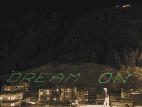
« PREVIOUS ENTRY
Robot love
NEXT ENTRY »
Robocow

Remember the HelloMrPresident project? Back during the 1991 Davos World Economic Forum conference, the designer Johannes Gees set up a web site where anyone could type a message to send to the conferencegoers. The messages were routed to a laser-projection system that displayed them in enormous letters on the side of a mountain facing the Davos ski resort.
Well, this December 10-13, the World Summit on the Information Society will take place — and Gees is at it again. This time, he’s doing the “HelloWorld” project, and setting up four projectors to display the messages on the UN building in New York, as well as three other sites in Geneva, Bombay, and Capetown. You’ll be able to SMS a message to be displayed to power elites worldwide.
As he puts it in his PDF explanation of the project:
THE HELLOWORLD PROJECT IS A REAL SPACE INTERFACE
FOR IDEAS THAT ARE TOO BIG TO FIT ON A COMPUTER SCREENThe message of the HELLOWORLD installation is:
- The world is one place. Information technologies are the highways along which ideas travel.
- Technology allows people to share their thoughts and insights.
- The power of words can overcome dissent.
- Information technology can strengthen the voice of every person, worldwide.
I love the sly reference in the project title. It is, of course, a nod to the use of “Hello, world!” as the first-ever piece of code that most people use when they’re learning a new computer language. Crack open just about any manual on a computer language, and the author will begin with a lesson on how to display text, and they’ll use “Hello, world!” — a witty evocation of sci-fi visions of artificial intelligence, where the machine comes awake and greets us with childlike innocence. Of course, half the time the A.I. winds up being a wonderful salvation and helpmate for humanity … and other half the time it becomes self-aware and rains hell down on the planet and everybody screams and screams and screams.
Ah, the razor’s edge between utopia and dystopia. What fun! This is something that most everyday people don’t realize about computer culture. Coders almost always know that when their software and networks become complex, things can often spin out of control. They won’t accidentally give birth to HAL-style A.I. — just good old-fashioned chaos, both destructive and creative. It’s lesson that applies to global politics as well, and it is, in a very subtle way, something underpinning Gees’s project too.
(Thanks to Textually.org for this pointer!)
I'm Clive Thompson, the author of Smarter Than You Think: How Technology is Changing Our Minds for the Better (Penguin Press). You can order the book now at Amazon, Barnes and Noble, Powells, Indiebound, or through your local bookstore! I'm also a contributing writer for the New York Times Magazine and a columnist for Wired magazine. Email is here or ping me via the antiquated form of AOL IM (pomeranian99).

ECHO
Erik Weissengruber
Vespaboy
Terri Senft
Tom Igoe
El Rey Del Art
Morgan Noel
Maura Johnston
Cori Eckert
Heather Gold
Andrew Hearst
Chris Allbritton
Bret Dawson
Michele Tepper
Sharyn November
Gail Jaitin
Barnaby Marshall
Frankly, I'd Rather Not
The Shifted Librarian
Ryan Bigge
Nick Denton
Howard Sherman's Nuggets
Serial Deviant
Ellen McDermott
Jeff Liu
Marc Kelsey
Chris Shieh
Iron Monkey
Diversions
Rob Toole
Donut Rock City
Ross Judson
Idle Words
J-Walk Blog
The Antic Muse
Tribblescape
Little Things
Jeff Heer
Abstract Dynamics
Snark Market
Plastic Bag
Sensory Impact
Incoming Signals
MemeFirst
MemoryCard
Majikthise
Ludonauts
Boing Boing
Slashdot
Atrios
Smart Mobs
Plastic
Ludology.org
The Feature
Gizmodo
game girl
Mindjack
Techdirt Wireless News
Corante Gaming blog
Corante Social Software blog
ECHO
SciTech Daily
Arts and Letters Daily
Textually.org
BlogPulse
Robots.net
Alan Reiter's Wireless Data Weblog
Brad DeLong
Viral Marketing Blog
Gameblogs
Slashdot Games